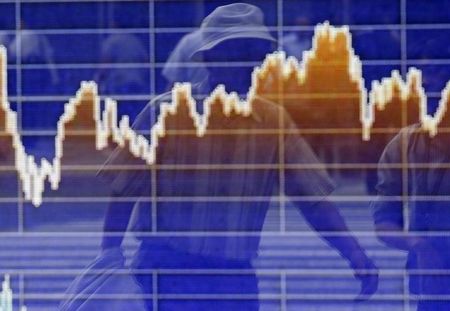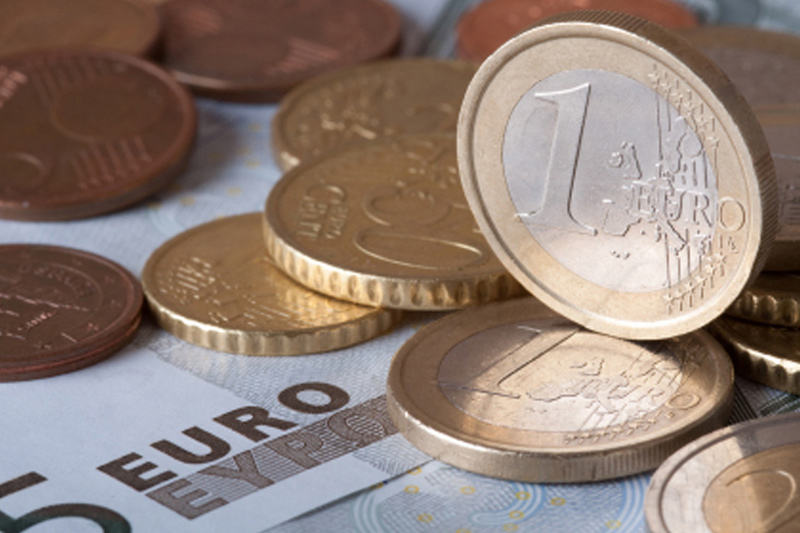By Wayne Cole
SYDNEY (Reuters) - The euro was deep under water on Friday, having suffered its steepest fall in three years after the European Central Bank stunned markets by cutting interest rates and embarking on a trillion-euro asset-buying binge.
The aggressive shift sent short-term bond yields into negative territory in Germany, France, the Netherlands and Austria, giving investors an overwhelming incentive to sell euros for higher-yielding assets elsewhere.
That stood in stark contrast to the United States, where upbeat data only reinforced the case for the Federal Reserve to wind down its stimulus, driving the dollar higher and sideswiping oil and gold in the process.
After surging on Thursday, European share markets looked set to start in a cautious mood as the U.S. payrolls report loomed large later in the session. Financial spreadbetters tipped losses of 0.1 percent to 0.2 percent for the FTSE 100 (FTSE), DAX (GDAXI) and CAC 40 (FCHI).
In Asia, Japan's Topix (TOPX) stalled just short of its January peak. Chart resistance is tough as a break there would take it to levels last seen in July 2008.
Chinese stocks extended their bull run, with the CSI300 (CSI300) of the leading Shanghai and Shenzhen A-share listings barrelling to their best in over eight months.
MSCI's broadest index of Asia-Pacific shares outside Japan (MIAPJ0000PUS) eased back 0.6 percent, having already reached its loftiest level since early 2008.
The Dow (DJI) had eased 0.05 percent, the S&P 500 (SPX) lost 0.15 percent and the Nasdaq (IXIC) 0.22 percent.
The euro was licking its wounds at $1.2934 <EUR=>, after hitting a 14-month low of $1.2920 <EUR=> overnight, and it seemed destined to test the July 2013 trough of $1.2898.
It hit a one-month low on the yen at 135.97 (EURJPY=R), while the dollar briefly spiked to a six-year peak of 105.71 yen <JPY=> before steadying at 105.35.
The single currency's capitulation came after ECB President Mario Draghi announced a range of rate cuts and a new plan to push money into the flagging euro zone economy.
In a news conference, Draghi said the aim was to expand the bank's balance sheet back to the heights reached in early 2012, which equates to a rise of around 50 percent or 1 trillion euros in new assets.
"The Governing Council will be pumping money into the economy while simultaneously penalising European banks that do not spend it," said Valentin Marinov, an analyst at CitiFX.
TURBO-CHARGED
"To the extent that at least some part of that money will head abroad, the turbo-charged easy money will likely invigorate euro-funded carry trades," said Marinov.
The already hugely popular carry trade is where investors borrow at low rates in euros or yen, for example, to buy higher-yielding assets in other countries. The latter include Australia, Canada, New Zealand and a whole range of emerging markets.
"We believe also that the longer-term impact of the measures would be to help unclog the lending channel of the eurozone and stimulate domestic demand," added Marinov.
Shorter-dated eurozone debt rallied hard after the ECB move, pushing the yield gap between U.S. and German two-year debt (US2YT=RR) (DE2YT=RR) out to 60 basis points, the fattest premium since May 2007.
Across the Atlantic, data provided fresh evidence that the U.S. economy was on track for sturdy growth in the third quarter. Companies hired workers at a steady clip in August and service sector activity accelerated to 6-1/2-year high.
That lifted yields on 10-year Treasuries (US10YT=RR) by 4 basis points to 2.453 percent, further supporting the dollar.
Investors are now keenly waiting for the latest read on the U.S. labour market due later on Friday. Analysts expect the pace of job creation to have picked up slightly in August, with a rise of 225,000 jobs on nonfarm payrolls.
With the U.S. dollar flying, commodities had to cheapen to stay attractive and gold <XAU=> struck a three-month low at $1,256.90 an ounce before clambering back to $1,264.30.

Brent crude oil was off 4 cents at $101.79 a barrel after shedding more than a dollar overnight, while U.S. crude edged up 4 cents to $94.49.
(Editing by Shri Navaratnam and Alan Raybould)
